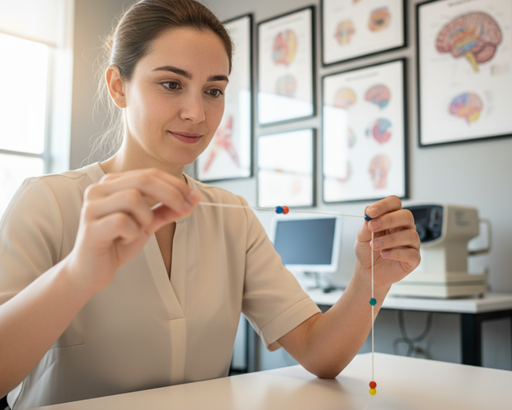Landmark Research: Vision Therapy is Key to Concussion Recovery at Perspective Optometry
At Perspective Optometry, we specialize in providing evidence-based care for post-concussion vision disorders. We recognize that the persistent symptoms that often prolong recovery—headaches, reading difficulty, and fatigue—are frequently caused by measurable deficits in the visual system that require active rehabilitation.
The CONCUSS Randomized Clinical Trial (RCT): New Standard of Care
Recent landmark research, known as the CONCUSS Randomized Clinical Trial has decisively moved post-concussion visual treatment beyond a "wait and see" approach by providing the highest level of clinical evidence to date.
Key Findings of the CONCUSS Clinical Trial
-
Comparison of Treatment Timelines: The CONCUSS randomized trial investigated the efficacy of starting immediate, specialized office-based vision therapy (known as OBVAM) for convergence insufficiency linked to concussion, contrasting it with a "watchful waiting" approach (delayed therapy).
-
Establishment of Evidence: This study represents a major breakthrough, offering the strongest clinical evidence yet that vision therapy is an effective treatment for vision problems that persist after a concussion, according to one of the authors, an American Optometric Association (AOA) member.
-
Clinical Recommendation: Based on these results, the researchers strongly advise that doctors should initiate OBVAM as soon as a diagnosis of concussion-related convergence insufficiency is confirmed, rather than waiting for the condition to resolve naturally.
The CONCUSS Randomized Clinical Trial (RCT), published in the British Journal of Sports Medicine in 2025, affirmed the efficacy and urgency of neuro-optometric rehabilitation for the most common visual deficits:
-
Study Design: This prospective RCT involved participants aged 11 to 25 with persistent post-concussive symptoms, specifically targeting concussion-related symptomatic convergence insufficiency (CONC-CI).
-
Key Finding on Efficacy: The trial demonstrated that patients receiving office-based vergence/accommodative therapy with movement (OBVAM) achieved statistically significant improvements in both clinical measures (like Near Point of Convergence) and a marked reduction in symptom severity scores, leading to faster recovery.
-
Key Finding on Timing: Crucially, the study showed that early intervention matters. Patients who began therapy promptly achieved better and faster outcomes than those who delayed treatment.
Investigator Dr. Mitchell Scheiman, O.D., emphasized the trial's implications, stating:
“This study provides the first high-quality evidence that concussion-related vision problems can be effectively treated with office-based vision therapy. Our findings clearly demonstrate that spontaneous resolution is uncommon, and early intervention is essential.” Link to AOA News Article citing quote: AOA News
[Link to CONCUSS RCT Reference: Alvarez, T. L., Scheiman, M., et al. (2025). CONCUSS randomized clinical trial of vergence/accommodative therapy for concussion-related symptomatic convergence insufficiency. British Journal of Sports Medicine.]
Foundational Evidence: Prevalence and Pre-RCT Success
The CONCUSS RCT builds upon years of research demonstrating the high prevalence and treatability of these conditions:
-
Prevalence of Visual Deficits: Studies conducted prior to the CONCUSS trial consistently showed that visual symptoms are prevalent after a concussion, with research reporting that approximately 70% of adolescents had concussion-related vision problems Master, C. L., et al. (2016). Clinical Pediatrics. [Link to study].
-
Common Diagnoses: A large retrospective study published in Optometry and Vision Science in January 2017 reviewed the records of 218 concussed patients. Researchers found that 82% of the patients were diagnosed with an oculomotor problem, with convergence insufficiency (difficulty aiming the eyes inward for near work) and accommodation insufficiency (difficulty sustaining clear focus) being the most common: Ciuffreda, K. J., et al. (2017). Optometry and Vision Science. [Link to study]
-
Pre-RCT Efficacy: This 2017 study also provided strong retrospective support for intervention, noting that of the patients who completed Vision Therapy, 85% of those with convergence insufficiency were classified as successful or improved.
Conclusion
The body of evidence is now conclusive: visual problems are a common, measurable, and highly treatable consequence of concussion. Dr. Randhawa’s evaluation of post-concussion patients at Perspective Optometry includes comprehensive testing of vergence, accommodative, and eye movement function to ensure prompt diagnosis and initiation of targeted neuro-optometric rehabilitation, accelerating the patient’s return to a functional life.



0 comments